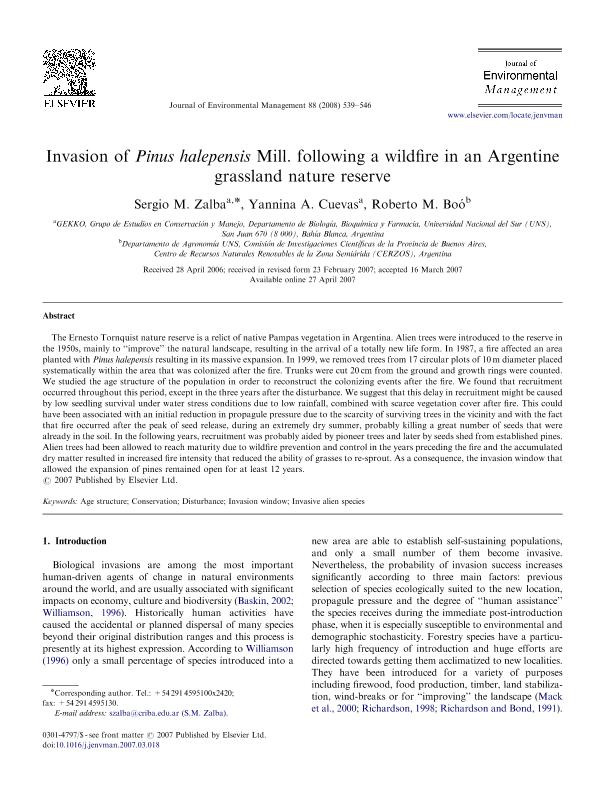Mostrar el registro sencillo del ítem
dc.contributor.author
Zalba, Sergio Martín

dc.contributor.author
Cuevas, Yannina Andrea

dc.contributor.author
Boo, Roberto Miguel

dc.date.available
2019-07-22T15:41:17Z
dc.date.issued
2008-08
dc.identifier.citation
Zalba, Sergio Martín; Cuevas, Yannina Andrea; Boo, Roberto Miguel; Invasion of Pinus halepensis Mill. following a wildfire in an Argentine grassland nature reserve; Elsevier Science Ltd; Journal of Environmental Management; 88; 3; 8-2008; 539-546
dc.identifier.issn
0301-4797
dc.identifier.uri
http://hdl.handle.net/11336/79955
dc.description.abstract
The Ernesto Tornquist nature reserve is a relict of native Pampas vegetation in Argentina. Alien trees were introduced to the reserve in the 1950s, mainly to “improve” the natural landscape, resulting in the arrival of a totally new life form. In 1987, a fire affected an area planted with Pinus halepensis resulting in its massive expansion. In 1999, we removed trees from 17 circular plots of 10 m diameter placed systematically within the area that was colonized after the fire. Trunks were cut 20 cm from the ground and growth rings were counted. We studied the age structure of the population in order to reconstruct the colonizing events after the fire. We found that recruitment occurred throughout this period, except in the three years after the disturbance. We suggest that this delay in recruitment might be caused by low seedling survival under water stress conditions due to low rainfall, combined with scarce vegetation cover after fire. This could have been associated with an initial reduction in propagule pressure due to the scarcity of surviving trees in the vicinity and with the fact that fire occurred after the peak of seed release, during an extremely dry summer, probably killing a great number of seeds that were already in the soil. In the following years, recruitment was probably aided by pioneer trees and later by seeds shed from established pines. Alien trees had been allowed to reach maturity due to wildfire prevention and control in the years preceding the fire and the accumulated dry matter resulted in increased fire intensity that reduced the ability of grasses to re-sprout. As a consequence, the invasion window that allowed the expansion of pines remained open for at least 12 years.
dc.format
application/pdf
dc.language.iso
eng
dc.publisher
Elsevier Science Ltd
dc.rights
info:eu-repo/semantics/openAccess
dc.rights.uri
https://creativecommons.org/licenses/by-nc-sa/2.5/ar/
dc.subject
Age Structure
dc.subject
Conservation
dc.subject
Disturbance
dc.subject
Invasion Window
dc.subject
Invasive Alieb Species
dc.subject.classification
Ecología

dc.subject.classification
Ciencias Biológicas

dc.subject.classification
CIENCIAS NATURALES Y EXACTAS

dc.title
Invasion of Pinus halepensis Mill. following a wildfire in an Argentine grassland nature reserve
dc.type
info:eu-repo/semantics/article
dc.type
info:ar-repo/semantics/artículo
dc.type
info:eu-repo/semantics/publishedVersion
dc.date.updated
2019-07-12T17:38:48Z
dc.journal.volume
88
dc.journal.number
3
dc.journal.pagination
539-546
dc.journal.pais
Países Bajos

dc.journal.ciudad
Amsterdam
dc.description.fil
Fil: Zalba, Sergio Martín. Universidad Nacional del Sur. Departamento de Biología, Bioquímica y Farmacia; Argentina. Consejo Nacional de Investigaciones Científicas y Técnicas. Centro Científico Tecnológico Conicet - Bahía Blanca; Argentina
dc.description.fil
Fil: Cuevas, Yannina Andrea. Consejo Nacional de Investigaciones Científicas y Técnicas. Centro Científico Tecnológico Conicet - Bahía Blanca; Argentina. Universidad Nacional del Sur. Departamento de Biología, Bioquímica y Farmacia; Argentina
dc.description.fil
Fil: Boo, Roberto Miguel. Provincia de Buenos Aires. Gobernación. Comisión de Investigaciones Científicas; Argentina. Universidad Nacional del Sur. Departamento de Agronomía; Argentina
dc.journal.title
Journal of Environmental Management

dc.relation.alternativeid
info:eu-repo/semantics/altIdentifier/url/https://www.sciencedirect.com/science/article/pii/S0301479707001193
dc.relation.alternativeid
info:eu-repo/semantics/altIdentifier/doi/http://dx.doi.org/10.1016/j.jenvman.2007.03.018
Archivos asociados
